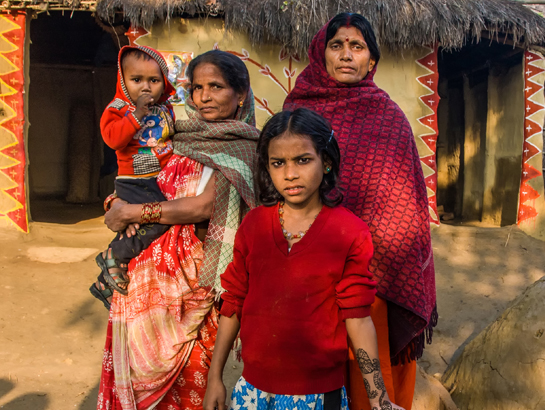Climate change-induced natural disasters, gender inequality, and malnutrition are interconnected issues that exacerbate human suffering. There is growing concern that adapting to climate change may increase the time burden on women and adversely affect their nutritional status. In the Indian state of Bihar, HarvestPlus tackles the triple challenge of climate change, gender inequality, and malnutrition through a combination of technological and institutional innovations.
Bihar faces the confluence of gender inequality deeply rooted in cultural norms, extreme climate variations impacting agriculture, and staggering malnutrition rates, especially among women and children. Despite recent economic growth, women continue to face marginalization, with limited access to education, health facilities, and financial resources. The adverse impact of climate change further exacerbates food insecurity and economic losses.
Bihar’s geographical diversity further exposes it to extreme climate variations, impacting food production and increasing the community’s vulnerability to food and nutritional insecurity. To address these challenges, the HarvestPlus program—which works across CGIAR as part of IFPRI, is spearheading initiatives to address these multifaceted challenges in Bihar through collaborative efforts with the state government, local non-governmental organizations, and the agricultural research and extension systems, in the following ways.
Empowered vulnerable women through the government’s “Jeevika” program, a catalyst for social and economic empowerment in rural communities. By forming self-help groups (SHGs), Jeevika mobilizes vulnerable women, offering them a platform to address challenges collectively. These groups evolve into self-managed entities, contributing to the overall empowerment of women in Bihar. By collaborating with Jeevika and other farmer collectives, HarvestPlus has strengthened the role of women in decision-making processes by actively involving women in awareness and training programs, where women’s capacity to drive sustainable agricultural interventions is enhanced.
Additionally, HarvestPlus has introduced biofortified crops, an innovative strategy to combat micronutrient deficiency. By collaborating with the government, the program promotes 52 biofortified crop varieties, aligning with the Prime Minister’s endorsement of this nutritional approach. HarvestPlus bridges the gap for Bihar’s farmers by providing essential resources such as high-quality seeds, crop advisory services, and financial assistance through collaboration with various partners, where they establish an end-to-end ecosystem for biofortification, ensuring farmers receive training in the latest cultivation practices.
Recognizing Bihar’s vulnerability to climate change, HarvestPlus collaborates with research entities—offering climate-resilient crop varieties, to empower farmers to mitigate the adverse effects of climate change by implementing climate-smart agriculture (CSA) practices. This not only reduces risks but also enhances overall resilience for food security and economic growth.
By implementing the strategies above HarvestPlus has positively impacted Bihar, transforming farming households into resilient communities by tackling climate-related challenges, empowering women, and alleviating financial and nutritional vulnerabilities thus paving the way for a healthier future, making a tangible impact on malnutrition, especially among women and children.
